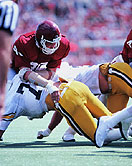
SATURDAY, Jan. 29 (HealthDay News) — High school athletes who have suffered two or more concussions may already have early symptoms of ‘post-concussion syndrome,’ according to a new study.
U.S. researchers looked at rates of symptoms in 260 athletes with one previous concussion, 105 with two or more previous concussions and 251 with no history of concussion. None of the concussions had occurred within the four-month period before the study.
Not surprisingly, rates of concussion-related symptoms were higher among athletes with previous concussions, but the finding was particularly true for those with two or more concussions.
When the investigators adjusted for other factors, they found that compared with athletes with either no concussion history or one previous concussion, athletes with two or more previous concussions were more likely to have a cluster of the following three types of symptoms:
- Intellectual symptoms, also called cognitive symptoms, such as memory problems or feeling “mentally foggy.”
- Physical symptoms, including headaches and problems with balance or feeling dizzy.
- Sleep symptoms, which could mean sleeping either more or less than they normally would.
Among all three groups of athletes, no differences were noted in terms of emotional symptoms, such as irritability or sadness.
The study was released online in advance of publication in an upcoming print issue of the journal Neurosurgery.
The researchers noted that the symptoms seen in high school athletes who’ve suffered two or more concussions are similar to those seen in retired professional athletes with a history of concussion. Recently, an autopsy of an 18-year-old high school athlete also showed evidence of a degenerative brain disease — chronic traumatic encephalopathy — which has been linked to experiencing multiple concussions while playing pro sports, according to background material in the study.
The findings should “serve as a caution for parents, coaches, and sports medicine personnel supervising high school and other youth athletes with a history of concussion,” wrote the researchers, led by Philip Schatz, of Saint Joseph’s University in Philadelphia, the International Brain Research Foundation in Edison, N.J., and the Sports Concussion Center of New Jersey.
In addition, “these study results support the recent surge in advocacy on state and federal governmental levels to establish youth concussion management programs and to better regulate the rules of youth sports,” they concluded in a journal news release.
More information
The American Academy of Family Physicians has more about sports-related concussions.

